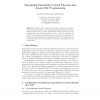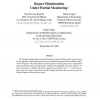914 search results - page 69 / 183 » Descriptions of Game Actions |
JELIA
2010
Springer
13 years 7 months ago
2010
Springer
Abstract. Nonmonotonic causal logic became a basis for the semantics of several expressive action languages. Norman McCain and Paolo Ferraris showed how to embed propositional caus...
SAGT
2009
Springer
14 years 3 months ago
2009
Springer
Abstract. We continue the recently initiated study of the computational aspects of weak saddles, an ordinal set-valued solution concept proposed by Shapley. Brandt et al. gave a po...
FLAIRS
2008
13 years 11 months ago
2008
Real-time 3D game environments provide a compelling medium for cinematic storytelling. Professional filmmakers have started using them for pre-visualization. They provide a low-co...
MOR
2006
13 years 8 months ago
2006
We consider repeated games in which the player, instead of observing the action chosen by the opponent in each game round, receives a feedback generated by the combined choice of ...
AI
2004
Springer
13 years 8 months ago
2004
Springer
Efficient Learning Equilibrium (ELE) is a natural solution concept for multi-agent encounters with incomplete information. It requires the learning algorithms themselves to be in ...



